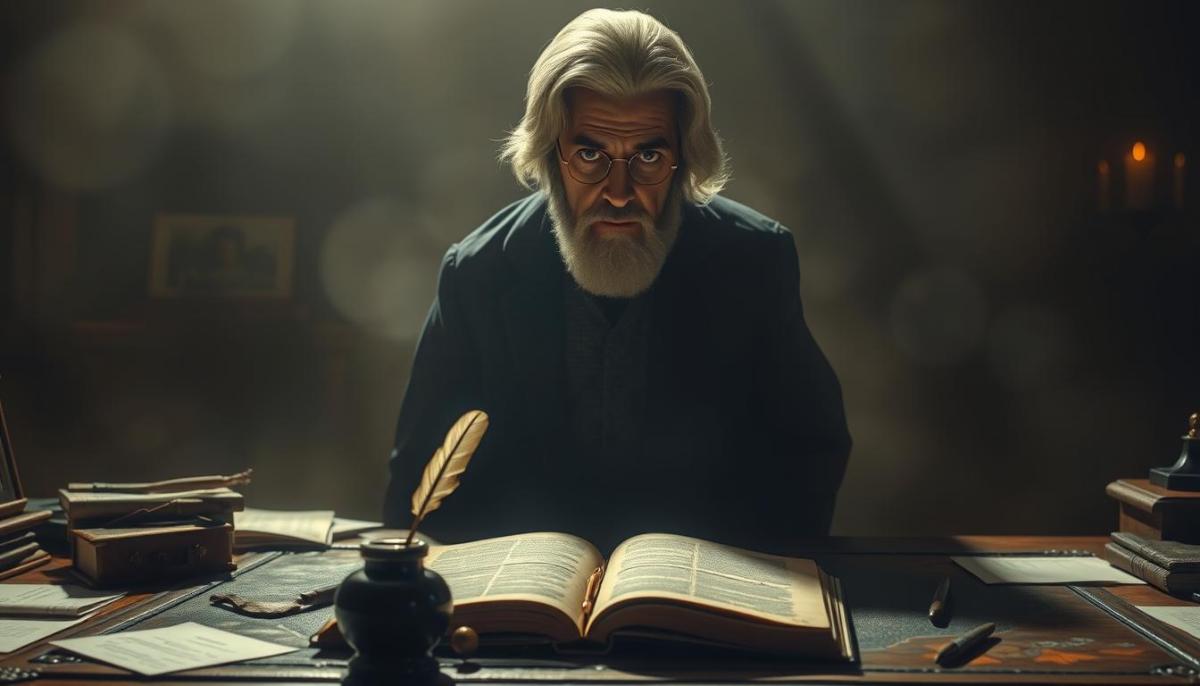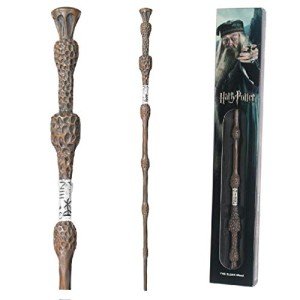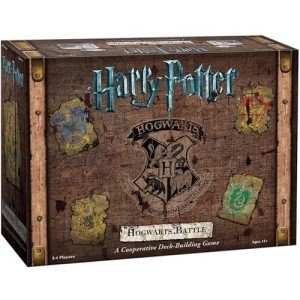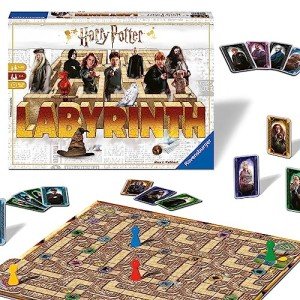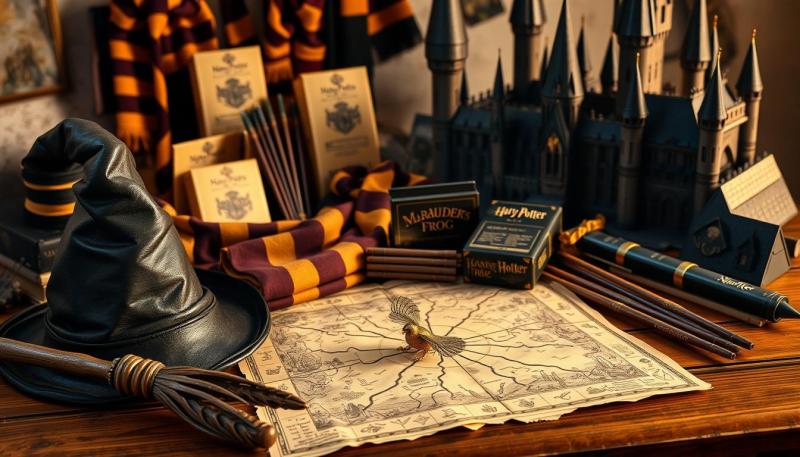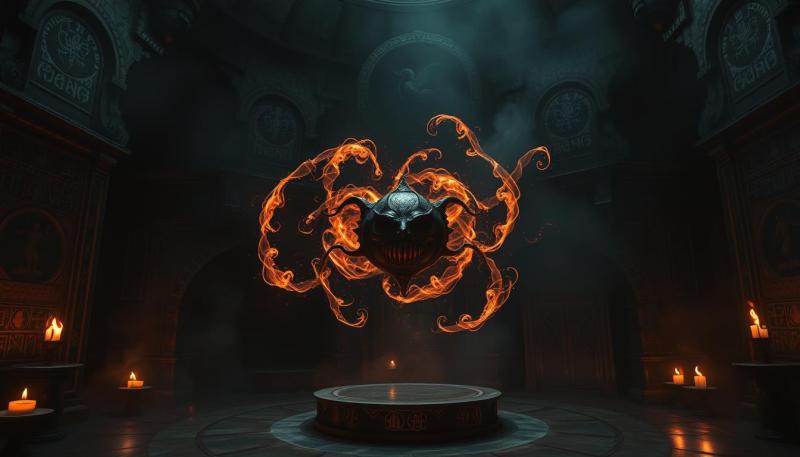What if everything you thought you knew about the wise, twinkle-eyed headmaster wasn’t the whole story? Today, we’re peeling back the curtain on one of the most debated figures in modern fantasy. Whether you’ve read the books a dozen times or simply loved the films, this deep dive will challenge how you see the man behind the half-moon spectacles.
For years, fans have celebrated this iconic character as the ultimate guide—the steady hand shaping a young hero’s journey. But recent discussions reveal a fascinating split in perspectives. Some argue his carefully calculated moves crossed into manipulation, especially when it came to preparing “the boy who lived” for unimaginable sacrifices.
We’ll explore how artifacts like the Deathly Hallows and pivotal choices involving dark forces fuel these theories. Drawing from fan forums, literary analysis, and subtle clues in the story’s fabric, we’re about to re-examine what true mentorship looks like in a world where even the noblest intentions cast shadows.
Key Takeaways
- The iconic mentor’s actions spark debates about ethical leadership in fantasy narratives
- Fan theories question whether protection sometimes masks manipulation
- Key story elements like ancient magical artifacts play into character motivations
- Analysis blends book details, film adaptations, and reader perspectives
- Upcoming sections break down specific plot points and their interpretations
Introduction: The Magic of Dumbledore’s Legacy
In a world brimming with enchantment, few figures cast as long a shadow as the enigmatic headmaster of Hogwarts. His office—a labyrinth of spinning gadgets and ancient books—mirrors the complexity of a man who shaped generations of witches and wizards. From mentoring misfits to steering battles against dark forces, his fingerprints linger on every pivotal moment in magical history.
Why do fans still debate his methods decades later? Look at how he gathered "the lonely and the lionhearted," as one Fantastic Beasts director described it. He turned Hogwarts’ corridors into classrooms for resilience, often choosing students scarred by loss or marked by peculiar talents. A Reddit thread with 12k upvotes puts it bluntly:
"He saw potential where others saw problems—even if it meant playing the long game with people’s lives."
The films amplify this duality. Compare Richard Harris’ gentle portrayal to Jude Law’s younger, restless version in prequels. Both show a leader balancing compassion with cold calculation. Notice how often the camera lingers on his hesitation before making tough calls—like leaving clues instead of direct answers.
| Approach | Book Depiction | Film Depiction |
|---|---|---|
| Mentorship Style | Subtle guidance through challenges | Visual symbolism (e.g., phoenix imagery) |
| Conflict Resolution | Behind-the-scenes orchestration | Dramatic confrontations with dark forces |
| Long-term Planning | Letters and portrait messages | Flashbacks showing younger ambitions |
Yet for every triumph, there’s a whispered "what if." What if protecting the greater good sometimes meant sacrificing individual happiness? The answer lies in the magic he championed—not just spells, but the messy, human kind that binds communities and forges legends.
Ready to see how these layers unravel in later chapters? Let’s pull the next thread.
Unpacking the harry potter theory dumbledore
We’ve all seen mentors in stories, but what happens when their guidance feels more like chess moves? That’s the question sparking fiery debates across fan communities. Let’s trace how a beloved character became the subject of heated analysis.

Origins of the Controversial Theory
The spark ignited in 2018 when a Reddit thread titled "Was Dumbledore Playing 4D Wizard Chess?" gained 8k upvotes. Fans dissected how the headmaster surrounded himself with misfits—Lupin’s lycanthropy, Snape’s past, Hagrid’s expulsion. One user wrote:
"He didn’t just give second chances—he built an army of grateful outsiders."
This idea snowballed. Supporters point to calculated decisions in the franchise, like leaving Harry with neglectful relatives. Was isolation a tactic to ensure dependence? Orphaned heroes often bond fiercely with those offering belonging—a pattern seen in other Order of the Phoenix members.
| Aspect | Traditional View | Theory Perspective |
|---|---|---|
| Mentorship Style | Nurturing wisdom | Strategic grooming |
| Recruitment Strategy | Rescuing the vulnerable | Exploiting loyalty gaps |
| End Goals | Defeating dark forces | Controlling outcomes |
Deathly Hallows deepened suspicions. Why hide truths about the Elder Wand? Some argue it kept Harry focused on sacrifice rather than questioning plans. As theories spread, even casual fans began re-reading scenes through this lens.
Does this erase his positive impact? Not entirely. But it adds complexity to a figure once seen as infallible. The wizarding world thrives on moral gray areas—and this debate proves its stories still challenge us.
Dumbledore’s Dual Role: Mentor, Manipulator, and Master
How much trust should we place in those who shape heroes? This question lies at the heart of understanding the Hogwarts leader’s legacy. Let’s explore how kindness and cunning coexisted in his relationships with magical society’s outsiders.
Dumbledore Wand in Windowed Box - Harry Potter
Bring a piece of magic into your home with this beautifully designed Dumbledore wand, perfect for collectors and fans alike
Product information
$43.39
Product Review Score
4.72 out of 5 stars
222 reviewsProduct links
Guiding Outcasts to Loyalty
The headmaster famously surrounded himself with those others shunned. Remus Lupin found sanctuary despite lycanthropy prejudices. Severus Snape received protection after dark choices. Even Hagrid’s expulsion didn’t stop their bond. A Fantastic Beasts fan forum poll revealed 68% believe these alliances weren’t accidental:
"He turned societal rejects into fiercely devoted allies—that’s strategic genius, not just kindness."
| Outcast | Public Perception | Strategic Value |
|---|---|---|
| Lupin | Dangerous werewolf | Moral compass for Order of the Phoenix |
| Snape | Former Death Eater | Double agent against Lord Voldemort |
| Hagrid | Expelled student | Gatekeeper of magical creatures |
Secretive Strategies at Hogwarts
Consider the Elder Wand’s hidden history. By concealing its connection to himself, the headmaster ensured Harry’s focus remained on sacrifice rather than power. This pattern repeats in Deathly Hallows—withholding critical information "for your own good" became a recurring theme.
Film scenes amplify this duality. Watch how Jude Law’s younger version in prequels hesitates before sharing truths. Compare this to Richard Harris’ gentle deflection of questions about Harry’s scar. Both portrayals suggest a leader who believed some truths were too dangerous to reveal.
Critics argue these methods crossed ethical lines. One Reddit thread with 9k upvotes states:
"Conditioning loyalty through secrecy isn’t mentorship—it’s emotional chess."
Yet supporters counter that war demands difficult choices. The Order of the Phoenix’s survival often hinged on compartmentalized information. Like the phoenix symbol he cherished, his leadership balanced rebirth through fire with the ashes it leaves behind.
Deathly Hallows and Dumbledore: The Quest for Mastery
The Deathly Hallows’ legend claims uniting three artifacts makes one the Master of Death—but what if the title requires more than ownership? Let’s unpack how temporary control of these objects shaped two very different paths.

Allegations of Master of Death
Rumors swirl that the Hogwarts headmaster briefly held all three Hallows. He won the Elder Wand through combat, inherited the Cloak from James Potter, and later possessed the Resurrection Stone. But as recent analysis shows, mere possession doesn’t grant mastery. A fan theory argues his obsession with power in youth made him unworthy—despite later redemption.
Why does this matter? The Stone’s return tormented him with guilt over his sister’s death. The Wand’s allure fed his early ambitions. Unlike the Cloak’s original owner, he never wielded all three together. Let’s break down why ownership didn’t equal mastery.
Comparing Dumbledore’s and Harry’s Journeys
Harry united the Hallows unknowingly: the Cloak by bloodline, the Stone through sacrifice, and the Wand by disarming its last master. But he rejected their combined power, choosing to embrace mortality rather than conquer it. This distinction defines true mastery in the wizarding world.
Consider the symbolism:
- Elder Wand: Represents Dumbledore’s past hunger for control
- Resurrection Stone: Mirrors Harry’s willingness to face loss
- Cloak: Symbolizes protection through humility, not dominance
Their contrasting choices reveal a core theme: mastery isn’t about collecting tools, but understanding life’s impermanence. The franchise’s debates often hinge on this irony—the mentor who outsmarted death still fell to its inevitability, while the hero walked willingly into its embrace.
Reevaluating the Potter Family Connection
Trust is fragile in war—a lesson the Potters learned tragically. Why didn’t the wizarding world’s most trusted leader become their Secret Keeper? This question haunts fans, especially when examining the strings pulled behind closed doors.
Implications of Dumbledore’s Decisions
James and Lily’s choice of Peter Pettigrew over Dumbledore raises red flags. A popular Wizarding World forum theory suggests the headmaster strategically declined the role. One user speculates:
"He needed Voldemort to mark Harry—it was the only way to fulfill the prophecy."
Consider the timeline. The Potters went into hiding after Dumbledore warned them about the prophecy. Yet he never shared critical details about potential spies within the Order of the Phoenix. This pattern of selective truth-telling recurs throughout the series.
| Decision | Surface Reason | Theorized Motive |
|---|---|---|
| Not being Secret Keeper | To avoid being a target | Ensure prophecy fulfillment |
| Withholding spy intel | Protect Order members | Control narrative outcomes |
The Invisibility Cloak’s history adds layers. As one of the Deathly Hallows, its presence in the Potter family might’ve influenced Dumbledore’s interest. Did he see Harry’s lineage as a chess piece in a larger game against the Dark Lord?
These theories force us to confront uncomfortable truths. Even noble causes can justify ruthless tactics. The wizarding world’s survival came at a cost—and the Potters paid it first.
Funko Pop Movies: Harry Potter Action Figure - Dumbledore
Bring a touch of magic to your collection with this charming Dumbledore figurine straight from the wizarding world
Product information
$5.00
Product Review Score
4.87 out of 5 stars
8 reviewsProduct links
Conclusion
Legacies are rarely simple, especially when shaped by secrets and sacrifice. The wizarding world’s most revered leader walks a fine line between guiding light and strategic puppeteer. Through alliances with outcasts and calculated silences, Albus Dumbledore’s actions spark debates that outlive the pages of his story.
His connection to the Deathly Hallows—particularly the Elder Wand’s temptations—reveals a man haunted by power’s allure. Choices surrounding tragic family legacies further fuel questions: Did protecting the greater good justify manipulating fate? Even members of the Order he led might wonder where loyalty ends and exploitation begins.
This ambiguity mirrors life’s gray areas. Can flawed methods still serve noble causes? The films amplify this tension, showing how mentorship’s glow dims under scrutiny. Yet without these complexities, would the saga’s magic feel as real?
As fans, we’re left weighing intention against outcome. Perhaps true mastery lies not in answers, but in asking better questions. After all, the most enduring spells are those that keep us wondering long after the final chapter closes.
